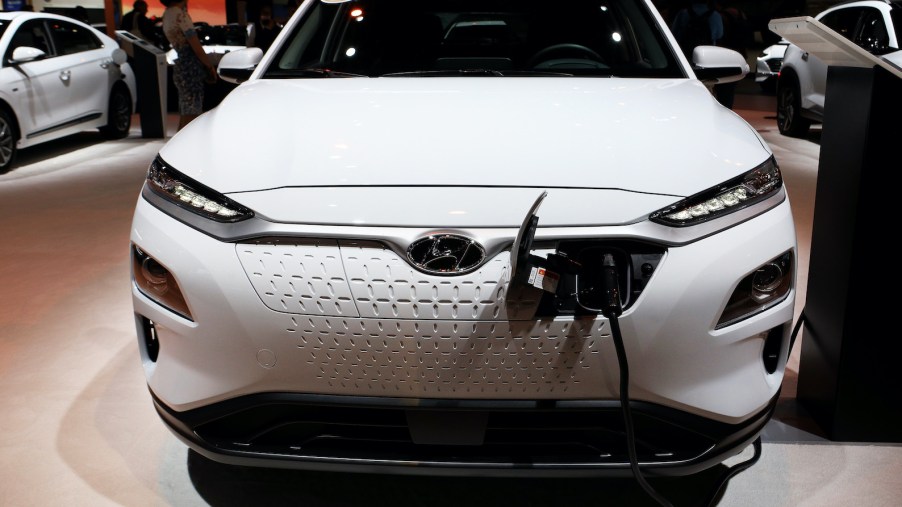
The Hyundai Kona Electric Is the Best Electric SUV Under $50,000
Car shoppers, rejoice. Electric vehicles have truly become a viable choice in just the past year or so. Thanks to more available charging stations and the new EVs’ improved ranges, EV owners can enjoy the same freedom as owners of cars with conventional gas engines. Some EVs like the 2020 Hyundai Kona Electric also have great acceleration and outstanding fuel economy. Kim Reynolds of MotorTrend has compiled a list of the best electric vehicles for under $50,000. Let’s go over the list and take a closer look at the Hyundai Kona Electric, the best electric SUV according to MT.
MotorTrend’s list of the best EVs under $50,000
Reynolds is quick to point out that not all electric vehicles are well-rounded. A few EVs are fast enough but have poor range. Others may be slow to charge or have a more unusual plug.
Another consideration is pricing. All of Tesla’s offerings—the Model S, Model X, and Model Y—run north of $50,000. And MotorTrend testers haven’t yet gotten to rate other competitors in the electric vehicle field such as the BMW i3 starting at $45,445, the Mini Cooper SE at $30,750, and the $34,020 Hyundai Ioniq Electric.
But the five EVs that did make it to MotorTrend’s list balance satisfactory range, rapid charging rate, peppy acceleration, and budget-friendly pricing under $50,000. For the 2020 model year, the EVs listed from last-ranked to first are the Nissan Leaf, the Kia Niro EV, the Chevrolet Bolt, the Hyundai Kona Electric, and the Tesla Model 3.
The Kia Niro EV and the Hyundai Kona Electric are the only SUVs on MT’s list. Even though these two EVs are corporate siblings, the Hyundai ranks higher. Why do the reviewers at MotorTrend prefer it over the Kia Niro?
What the Hyundai Kona Electric has to offer
The front wheels of the Hyundai Kona Electric are driven by a 201-hp electric motor, which is powered by a 64.0-kWh battery pack. The Kia Niro EV uses the same lively drivetrain and also shares the Kona’s excellent fast-charge rate of 75 kW.
But a difference in curb weight is where the Kona and the Niro part ways, giving the Kona a big advantage in handling and performance. At slightly over 3,700 pounds, the curb weight of Hyundai’s electric SUV is more than 200 pounds lighter than the Kia. This is a plus for the Kona’s more agile handling as well as a very respectable 0 to 60 mph of 6.6 seconds. For these reasons, the Kona is a fun and capable city driver.
The Hyundai Kona’s better range is an added benefit of less weight. EPA estimates show that it runs for 258 miles, compared to the Niro’s 239 miles. Intensive regenerative braking accounts for this excellent range, which also allows for true one-pedal driving. Fuel economy rates at 130 MPGe highway and 102 MPGe for city driving, according to the EPA.
Inside the cabin of the Hyundai Kona Electric, the materials and design closely mirror its non-electric Kona counterpart. Reynolds feels the rear seat area is a bit tight but keep in mind that this vehicle accommodates a battery pack. Cargo capacity is adequate with just over 19 cubic feet with the rear seats up and almost 46 cubic feet with them folded down.
Standard advanced safety features are automatic emergency braking with forward-collision warning and lane-departure warning and lane-keeping assist. Options include adaptive cruise control, lane-centering, and a head-up display.
What makes this EV an excellent value?
For EV shoppers who want a commuter car that challenges competitors such as the Chevy Bolt and the cheapest version of the Tesla Model 3, the 2020 Hyundai Kona Electric is a great buy. Its base price range runs from $38,330 to $46,540.
MotorTrend’s Reynolds isn’t keen on the Kona Electric’s salamander-like front fascia nor its eco-friendly yet performance-sacrificing tires. He recommends that buyers opt for available adaptive cruise control and lane-centering.
But this Hyundai EV has so much more going for it: torquey performance, nimble handling, excellent range, quick charging—all for under $50,000. MotorTrend praises the Hyundai Kona Electric as “one of the best affordable electrics on the market.” For buyers who want an electric SUV that won’t break their budgets, that’s great news.


